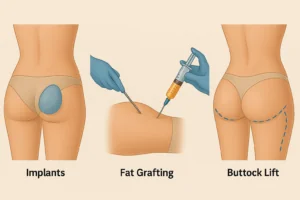Dental implants are one of the most important developments in modern dentistry. These artificial roots, which replace lost teeth, are of great importance for both aesthetic appearance and oral health. In this article, we will answer frequently asked questions about dental implants and examine the implant treatment process in detail.
What is a Dental Implant?
Dental implants are artificial tooth roots that replace missing teeth. These small screws, usually made of titanium, are inserted into the jawbone and integrate with the bone over time. This process is called osseointegration. Implants form a solid foundation for the prosthetic teeth placed on them.
Advantages of the Implant
Dental implants have many advantages:
- Provides natural look and function
- Increases chewing power
- Solves speech problems
- Helps maintain the shape of the face
- Does not damage neighboring teeth
- Long service life
Who Can Have Implants?
Ideal candidates for implant treatment are:
- Those in good general health
- Those with adequate bone density
- Those with good oral hygiene habits
- Non-smokers or those willing to quit
Implant Treatment Process
Implant treatment consists of several stages and usually takes several months. This process can vary according to the patient's condition and needs.
Initial Examination and Planning
In the first stage, the dentist performs a detailed examination. This examination includes the following:
- Intraoral examination
- X-rays and tomography
- Assessment of general health status
- Creation of a treatment plan
Bone Graft Need
In some patients, there may not be enough bone tissue in the area to be implanted. In this case, a bone grafting procedure may be required. Bone grafting is a procedure to strengthen the bone tissue before the implant.
Implant Placement Procedure
Implant placement is usually performed under local anesthesia. The procedure sequence is as follows:
- Gum opens
- A socket is made in the jawbone
- Implant is placed
- The gum is closed
Recovery Process
After the implant is placed, a process called osseointegration begins. In this process, the implant integrates with the jawbone. The healing process usually takes 3-6 months.
Prosthetic Tooth Making and Placement
After the healing is complete, prosthetic teeth are made. These stages are as follows:
- Measurement
- Design and production of prosthetic teeth
- Attaching the prosthetic tooth to the implant
Implant Care and Considerations
Regular maintenance is essential for the longevity of implants. Here are the points to pay attention to:
Daily Care
- Brush teeth at least twice a day
- Use dental floss or an interdental brush
- Use antibacterial mouthwash
Regular Checkups
- Visit the dentist at least twice a year
- Contact your doctor immediately if you notice any problems
Avoiding Bad Habits
- Do not smoke
- Avoid overly hard foods
- Use a night guard if you have a habit of grinding your teeth
Frequently Asked Questions
Is Implant a Painful Procedure?
Since the implant procedure is performed under local anesthesia, no pain is felt. There may be mild pain and swelling for a few days after the procedure, but this is normal and can usually be controlled with painkillers.
How Durable Are Implants?
With good care, implants can last a lifetime. However, the prosthetic tooth on it may require replacement every 10-15 years.
Is Implant Treatment Expensive?
Implant treatment may initially be more costly than other dental treatments. However, it is considered to be a more economical option in the long run, because with the right care, it can be used for a lifetime.
Can I Eat Immediately After Having Implants?
It is recommended to eat soft foods for a few hours after the implant is placed. During the first week, you should follow a soft diet and avoid direct pressure on the implant site.
Implant Complications and Risks
As with any surgical procedure, implant treatment has some risks. However, these risks are quite low when performed by an experienced physician.
Possible Complications
- Infection
- Nerve damage
- Implant failure (osseointegration failure)
- Damage to neighboring teeth
- Sinus problems (upper jaw implants)
Risk Factors
Some factors can influence implant success:
- Cigarette smoking
- Uncontrolled diabetes
- History of radiotherapy
- Inadequate oral hygiene
- Bruxism (teeth grinding)
Implant Alternatives
The implant may not be suitable for every patient. In this case, alternative treatment options are as follows:
- Bridges
- Removable prostheses (dentures)
- Partial dentures
Each alternative has its own advantages and disadvantages. You and your dentist should decide which option is right for you.
Conclusion
Dental implant is a modern and effective treatment method that replaces missing teeth. It has many advantages in terms of natural appearance and function, longevity and oral health protection. However, like any treatment, implant treatment requires careful planning, appropriate patient selection and regular care.
If you are considering an implant, you should consult a dentist for a detailed examination and evaluation. Your dentist will create the most suitable treatment plan for you and answer all your questions.
Remember that oral and dental health is an integral part of your overall health. With regular dental check-ups, good oral hygiene and appropriate treatment when necessary, you can have a healthy and beautiful smile.

























